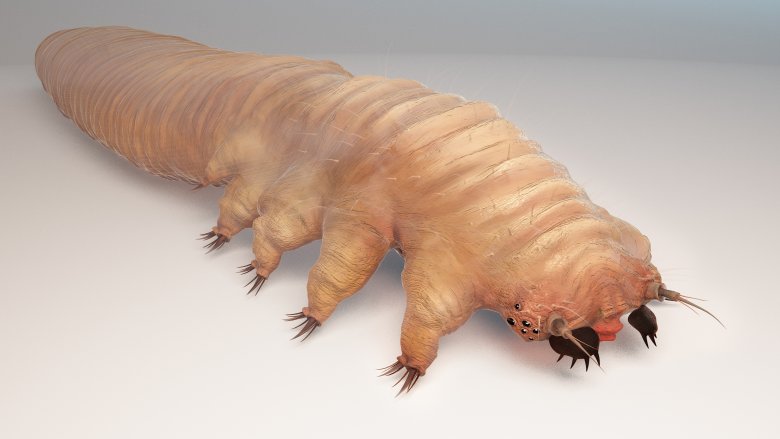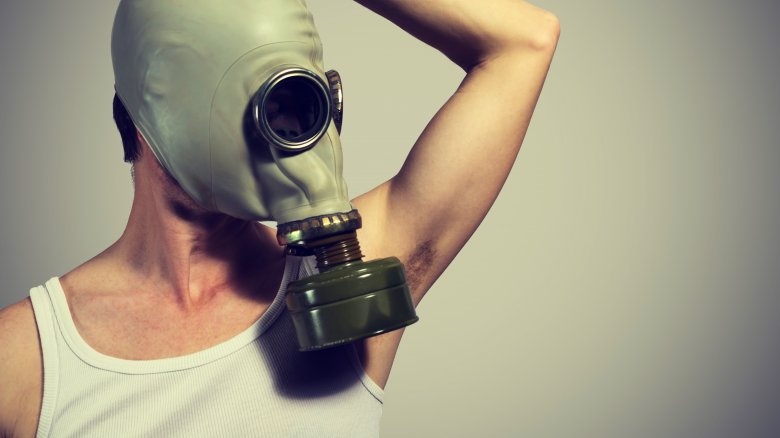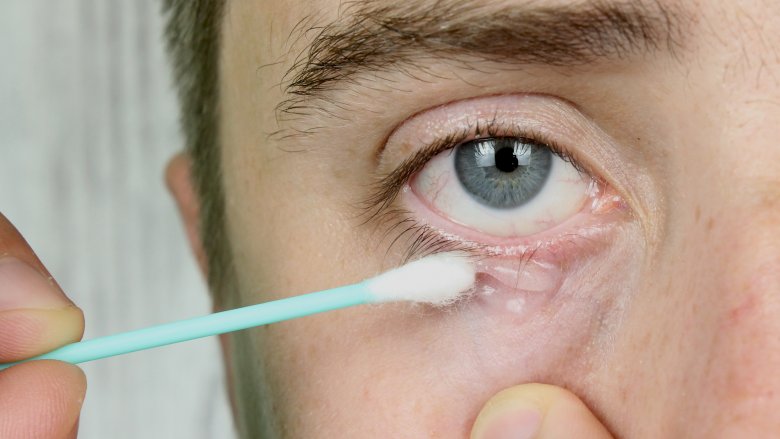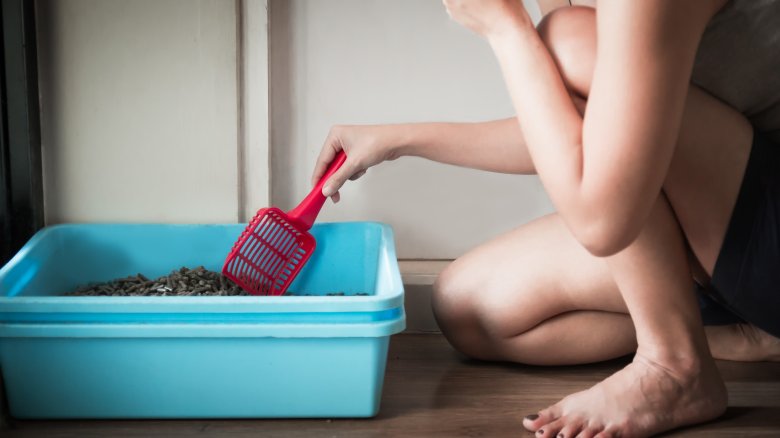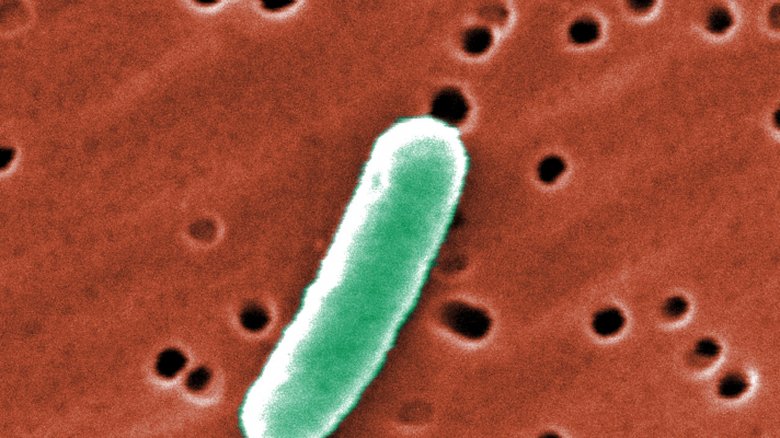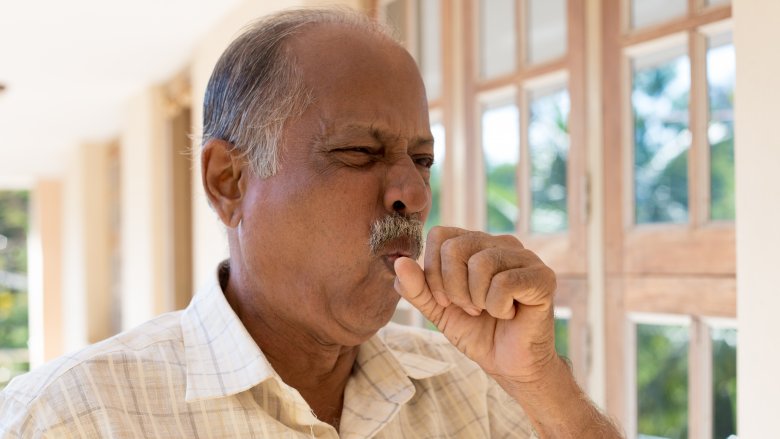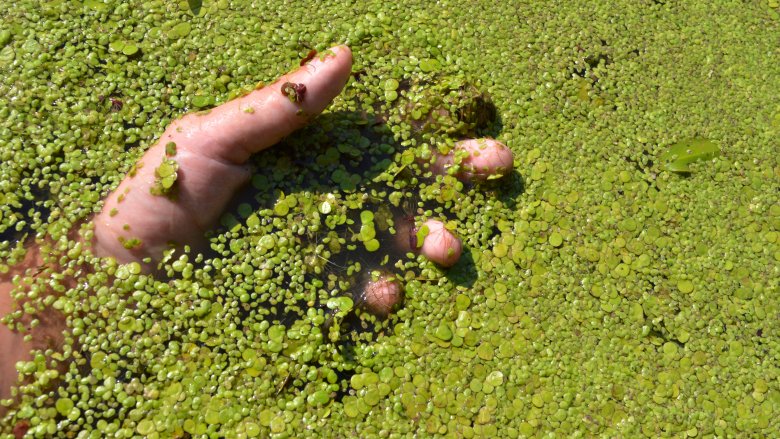Weird Organisms That Are Living On Your Body Right Now
"Find yourself," they say. But what are "you," exactly? You might think of yourself as this autonomous, independent being who controls your own fate, but that fanciful notion doesn't take into account the billions of weird organisms that call your body home.
The truth is, you have a lot more in common with Venom — that half-man, half-parasite comic book character with the big teeth — than you think. Your body forms the ground beneath entire civilizations of weird critters, with epic journeys and ruthless wars taking place at all times. Every part of you, from your gut to your eyeballs, is crawling with these little microscopic creatures, and there's no point trying to get rid of them with rubbing alcohol because there are lots of bugs living on you. Estimates vary, but you could have as many non-human cells as human ones. Here are some of the weirdest little organisms currently living on you.
The cute little arachnids creepin' about on your face
Lice are terrifying. Getting scabies is even worse. But these little flesh-crawling arachnids have a tiny cousin, who gets away with living on your face 24/7 because it's smart enough to not make you itch.
Meet the Demodex mites, the lifelong pals you never knew about (until now). Don't feel bad for not noticing them because you're not alone: A 2014 study showed that 100 percent of adults tested for Demodex mites on their faces had Demodex DNA lying around. According to the BBC, you probably have anywhere from hundreds to thousands of Demodex mites poking your cheeks right now, and even if you did come up with some scorched-earth solution to get rid of them, the population will rebound in only six weeks because these creepy-crawlies live everywhere from your towels to your pillowcase. There's no place quite as special as your face, though, which offers delicious dead skin cells, sebaceous oil (for free!), and is even covered with millions of tiny holes, called pores, which are perfect for the mites to lay their eggs in. We know relatively little about Demodex mites and what they do for us, but they don't seem to be harmful. Still, good luck getting any sleep tonight.
Your belly button is a rainforest
Next time someone tries to poke you in the belly button, you could stop them by casually mentioning that their finger is going to get slathered in bacteria. If you navel-gaze deeply enough into your cute little stomach hole, preferably with a microscope, National Geographic says you'll find thousands of tiny creatures, all living, eating, and swimming together in ... uh, harmony? Weird as it sounds, your belly button is actually a thriving ecosystem. After testing 60 belly buttons in 2011, scientists pulled out 2,368 different species of bacteria, over half of which were previously undiscovered. Some belly buttons were like gated communities with only 29 species of bacteria, while other ones hosted open free-for-alls of up to 107 species, with most having 60-some species. Every belly button, though, had a lot of diversity.
One person's unwashed innie even hosted an extremophile bacteria strain that is usually only found in ice caps or thermal vents, so maybe joining the navel neighborhood is a nice form of bacteria retirement? Who knows.
The armpit monsters
Ever wonder why your armpits stink? It turns out the term "body odor" is something of a misnomer, if that helps ease your guilt a bit. According to Popular Science, it isn't really the innocent sweat in your pits that causes that terrible smell, but rather, it's the fact that when your armpit produces liquid, it's like dessert to a certain type of bacteria, called Staphylococcus hominis, and the hungry interaction between bacteria and sweat produces the familiar foul odor haunting every locker room. Today's deodorants don't fix the problem, either: They mostly mask the scent or kill the bacteria, neither of which is optimal.
The malodorous products formed by this interaction, according to NPR, are called thioalcohols. While most people would rather stay clear of smelly pits, the researchers studying this matter are taking one for the team, investigating the source, and — fingers crossed — paving the way for a new breed of deodorant that could one day stop these bacteria from producing the thioalcohols altogether. Keep up the good work, folks.
Don't blink
Nobody likes touching their eyeballs. Nobody likes thinking about touching their eyeballs. Nobody wants to see pictures of people messing with their eyeballs. If you want another reason to never poke them, though, you should know that there are probably colonies of little critters skipping around on your corneas, enjoying their lives, totally invisible even though you're constantly looking right at them. According to Time, the longstanding belief that eyeballs were lifeless deserts got shattered in 2017, when researchers at the National Eye Institute found a little bugger named Corynebacterium mastitidis on eye swabs taken from mice. It's highly likely that similar critters call your eyes their home, and since they're not contagious, it's believed they get passed on by your mother.
So, you can blame Mom for this one ... or thank her, actually, because these little guys are good for you. The benevolent bugs on your peepers seemingly work overtime to keep out hostile pathogens, according to a paper published in the scientific journal Immunity, preventing nasty stuff like pink eye and conjunctivitis from growing there, instead. So if you enjoy your ocular health, then you better learn to love your little eye monsters.
How do you feel about the smell of cat urine?
There's no Venom symbiote in real life, but the closest equivalent might be Toxoplasma gondii, the parasite responsible for a condition called toxoplasmosis, which the CDC estimates may be infecting 40 million people in the U.S. today. How is that not a health crisis raging across the headlines? Well, because the symptoms aren't easily noticeable. According to Psychology Today, folks with toxoplasmosis may experience subtle (but dramatic) behavioral shifts, such as becoming more reckless, impulsive, getting in more car accidents, and maybe even being at greater risk for developing schizophrenia. People can go their whole lives with toxoplasmosis, never realizing that these parts of their "personality" are the devious work of a puppet master parasite.
Worried you might be playing host to these beasts? Okay, here's a question. How do you feel about the smell of cat urine?
That's not a trick question. See, rats normally have a natural abhorrence for the smell of cat pee, since it's a pretty good sign that a ferocious feline lurks near. Weirdly enough, though, cats infected by T. gondii are obsessed with cat urine, a suicidal behavior deemed "fatal attraction syndrome." Now, while Fluffers doesn't pose much threat to humans, a 2011 study found that toxoplasmosis-infected men rated the scent of cat pee as more pleasurable than non-infected men, while the opposite was true for women. (No one was told what they were smelling, obviously.) Creepy stuff.
E. coli is always inside you, and you should be happy about it
There are a lot of bacteria strains out there, busting their butts and trying to get noticed, but E. coli is practically a household name. At least once a year, headlines start spinning about E. coli outbreaks in ground beef or romaine lettuce, sending everybody screaming for the hills. As Scientific American points out, though, E. coli is not only swimming in your gut right now, but you should appreciate them more. Your intestines are teeming with various strains of these wormy little creatures, and the key factor is knowing the do-gooder E. coli bacteria from the bad boys. For example, one type of E. coli does the thankless task of manufacturing vitamin K, helping keep you alive. And you never even thanked them, did you?
In other words, these heroic E. coli are basically the X-Men of the bacteria world, unfairly feared and hated because their evil counterparts induce bloody diarrhea, abdominal cramps, and hemorrhagic colitis, according to the American Society for Microbiology. So don't be judgmental, and learn to accept the good E. coli as part of what makes you who you are.
Open wide
Don't wince, you knew this was coming. Every little kid goes through a phase — or a lifetime — of getting freaked out about sharing juice bottles because those mean ol' germs might get them. Don't blame the germs, though. Your mouth is a great habitat to live in, with nice tropical climates, moody lighting, and a constant supply of interesting food. If you found out that Hawaii was actually the scalp of an underwater giant, you'd still still vacation there, right? (Maybe?)
The numbers, though, are absolutely staggering: according to Harvard professor Sigmund Socransky, you probably have more bacteria crawling around in your mouth than there are human beings on the planet Earth. Yikes. What's really crazy is that each person's mouth colony is wildly different from the next, to the point where the the American Association for the Advancement of Science even compares your distinct mouth bacteria profile to a fingerprint, or a signature. The tiny cities in a person's mouth are dramatically impacted by tobacco use, cultural background, diet, exercise, toothpaste brands, and every other factor imaginable, so when people kiss, it's probably like the world's biggest rock concert to all the bacteria involved.
The war in your nostrils
No matter what your nose looks like, it probably has two holes. These little dark zones have become a fierce battleground between good and evil bacteria ... um, right under your nose, according to Nature. As every health care worker learns during clinicals, about 1 in 3 people carry something called Staphylococcus aureus in their nostrils. No big deal, except every once in a while, these critters wriggle their way into your bloodstream, infecting you with a nightmarish flesh-eating superbug called MRSA. This horror movie infection is resistant to antibiotics and kills 11,000 U.S. citizens a year. Creepy stuff.
Here's the good news. If your nostrils contain a more heroic strain of bacteria, named S. lugdunensis, you're six times less likely to carry MRSA. Only 9 percent of people naturally carry the good strain, but there's hope that it could be developed into a preventative medication, like a nasal spray, which would wrap up that MRSA problem once and for all. Hopefully.
The couple that shares together...
By now, you've probably come to terms with the fact that your body belongs to billions of other lifeforms. Now, imagine that you merge this thriving society with another society, like two big cities building a bridge between them. You know what happens? Better cocktail parties. The populations immigrate, diversify, have babies, and create a new culture.
Yes, that's what happens when you get a lover. You and your partner share not just a bed, but also colonies of bacteria, with the New York Times saying that the biggest colonies that get merged are the skin bacteria, followed by eyelid and belly button bugs. Basically, knocking boots with somebody is a pretty historic event for all those creatures. Of course, some of the more intimate parts of bedtime wrestling prompt a lot of bug-swapping as well. As much as people might hate to hear it, the Independent says there are plenty of tiny life forms living in the urethra, and plenty on the outer pieces of the genitals, as well. When partners of any preference or organs do the nasty, these creatures migrate and make new homes for their youngsters. So you can start a little family without even birthing a human child!
The microscopic zombies just waiting to eat your corpse
Many of the critters inside you aren't creepy monsters, but rather, your best friends. Be a little wary of them, though, because National Geographic says while plenty of bodily organisms are sorta/kinda okay with you being alive, they've purchased front row tickets to your eventual demise. Thanks, nature.
See, once you finally kick the bucket, the friendly colonies of your gut start devouring you from the inside out, while the skin bacteria breaks down the doors from the outside in. It's ugly. It's chaotic. It's called decomposition. And even though your body spends its whole life fighting this event off, in numerous wars and battles, everyone loses in the end. Assuming you're not cremated, according to Vice, the whole process reaches its grossest extreme when your body gets so bloated that it bursts, leaking ammonia all over the place. Don't think embalming will save you, either, since it merely slows down the unstoppable decline by pumping your body full of chemicals and pickling you like a cucumber. Which, honestly, might be the only thing more disturbing than regular decomposition.
No point avoiding the inevitable, really. The Earth eventually takes everything back.
